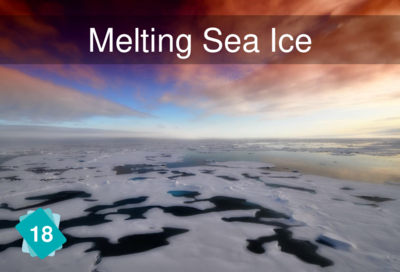En-en adult card 18 melting of sea ice
Card #18: Melting Sea Ice
Sea ice melting does not make the sea level rise (just as a melting ice cube does not make a glass overflow). However, when it melts, the white ice gives way to much darker sea, which absorbs more sun rays.
Explanation
For a further explanation of why melting sea ice does not raise de sea level, Archimedes and all that, see the explanation page.
For some great graphics that illustrate Earth's ice loss, check out this article from ESA.
Facilitation advice
This is the trap in Batch 1 which almost everyone falls into, unless they have read the cards from the start. For this reason, do not ask players to read the cards during batch 1. Instead, tell them that they can try to do it without explanations and once they have fallen into the trap, ask them to read the cards.
Correction
Causes
Consequences
No main consequences
Other possible links
Other consequences
- Radiative forcing When the ice pack melts, a white surface is replaced by a dark blue surface, which has a lower albedo and therefore absorbs more energy. This relationship is not essential but it does allow another feedback loop of the game to be put forward.
- Terrestrial biodiversity The poor polar bear is a powerful symbol of the climat. If players make this connection, suggest they draw a bear!
- Marine biodiversity There's probably some sort of link here...
Wrong links
Wrong consequences
- Additional greenhouse effect This link would mark confusion with the amplifying effect due to albedo. The white sea ice melts to reveal a darker surface underneath and the extra energy absorbed warms the Earth. This mechanism is called albedo and has nothing to do with the greenhouse effect. It belongs to the orange arrows on card 13, not to the red arrows.
- Disruption of the water cycle The melting of the Arctic ice pack, but also the melting of Greenland's glaciers may lead, in the distant future, to a disruption of the thermohaline circulation (which gives rise to the Gulf Stream). But beware, the "Water Cycle" card does not refer at all to the thermohaline circulation.
- Rising Sea Levels The melting of the ice pack is not responsible for the Sea Level Rise.
